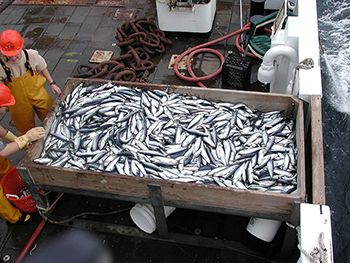This week the Conservation Law Foundation’s Peter Shelley published a vitriolic response to the midwater trawl fleet’s herring quota overrun in Northeast Area 1B earlier this month, calling it the pathological behavior of bad fishermen.
Shelley accuses the fleet of blatant — and apparently compulsive — disregard for the rules, saying that "this was inexcusable and intolerable behavior for a modern fishing fleet." The only problem is, it appears they followed the rules. NMFS claims that agency staff simply couldn’t keep up with the daily landings in order to call the closure before the quota was overshot. Well if the professional fish counters can’t keep up, then how do we expect the fishermen themselves to do a better job at it?
No one is arguing that it's a good idea or a sign of effective management to exceed any quota by 60 percent. So what should the solution be? Shelley contends it’s up to the fleet to somehow conjure data on everyone else’s catches so they can tally and self-monitor.
I’m not sure what fishery management fantasy he is imagining, but I’m quite sure few conservationists would approve of self-monitored fisheries. The fact is, the managers are the people who keep track of the quotas as compared with the landings. They are the people who let the fleet know it’s time to stop fishing. That is their job.
Until then, fishermen will fish.
It could be that the managers are having a hard time tallying daily numbers on the herring fleet. The fleet is quite small, but the numbers are big. The solution to that problem, however, is not to blame the fishermen for the flaws of the management system. Rather, we should look to find solutions that help the managers keep a count on the landings so we can avoid this happening again.
You can call the fishermen bad names and throw up your hands if it suits you. But it doesn’t do much toward creating solutions to the problem. If anything, it creates more of a divide where we need to build bridges.







